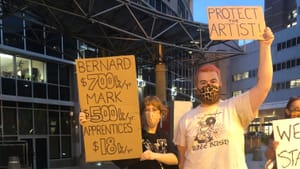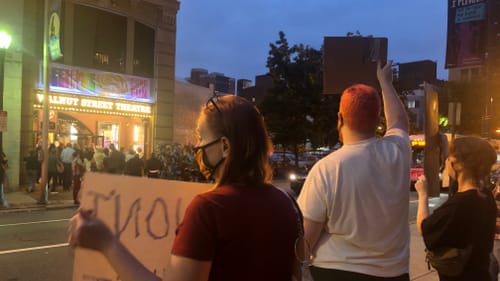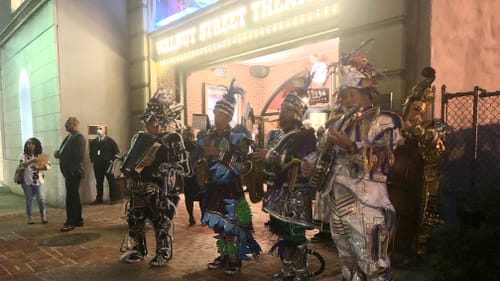Stay in the Loop
BSR publishes on a weekly schedule, with an email newsletter every Wednesday and Thursday morning. There’s no paywall, and subscribing is always free.
A new opening scene
Philly’s Protect the Artist protestors take their demands to the Walnut’s opening night

If the Walnut Street Theatre (WST) hoped to quell public criticism of its hiring practices and failure to live up to its own Diversity, Equity, and Inclusion (DEI) statement with Wednesday night’s season opener, Beehive: The 60s Musical, it failed. Let’s get one thing out of the way: this is not a proper review of Larry Gallagher’s condescending, passé 1986 revue, though some discussion of it necessarily figures in.
Before the Mummers showed up on opening night to drown out dissent, before a team of white guys showed six women actors how to lighten up the civil rights era in this, the first WST mainstage show since Covid-19, a plethora of factors led to what may be the most baldly hubristic moment in WST artistic director Bernard Havard’s career.
Havard’s Walnut history
Prior news stories abound, including BSR’s coverage of a June 2021 protest pointing to accusations of Havard barging into women’s dressing rooms after a cursory knock, colorism, tokenism, massive wage disparity, size discrimination, oppressive working conditions, and no mainstage directors of color. That protest followed the cease-and-desist letter Havard dispatched to local actor and voice artist Jenna Pinchbeck, who responded by launching the Protect the Artist (PTA) coalition.
Last year, even gospel icon Richard Smallwood—who sang at George Floyd’s funeral—spoke up about the Walnut, defending a WST apprentice who, in June 2020, shared in a Facebook video about being the only Black face in the room, experiencing multiple microaggressions from his castmates (“An HBCU? Never heard of it. Is it accredited?”), and getting fired after one castmate accused him of sexual harassment and being “too aggressive.” That performer, Ladarreun Taylor, has since retained a lawyer and, like PTA organizers, is collecting the stories of those who have had similar experiences at the theater.
Under Havard’s leadership, the Walnut has even had a contentious relationship with the Barrymore Awards, initially hosting the event but eventually, in what many perceive to be a case of sour grapes, dropping out altogether. For the Walnut, success seems to be measured not through innovation, diversity, quality, or relevance, but as a numbers game: largest subscriber base, oldest theater, most students served.

Even here, Havard’s thin skin shows. A 2010 partnership with the Philadelphia Inquirer (in which I was invited to participate as a speaker) offered season mainstage tickets to 100 high school students plus a guardian in return for written articles to be published in the newspaper and on the Walnut’s website. The catch, revealed after the project’s start? All were expected to be either promotional features or positive reviews. Suffice it to say many, including the project’s coordinator, several students, and newspaper representatives called out the self-serving bait-and-switch tactic.
Another number worth noting: in 2019, WST announced a proposed $39 million expansion project, for which Havard promises more student programs and “discovery of new playwrights and the development of new and rarely seen works, as well as the commissioning of new works by established writers.” If, 39 years into his tenure, with a mainstage, two smaller stages, several classrooms, programs, and all those bragging rights, Havard hasn’t made any of this a priority, why should the city, state, and private philanthropies believe he will now?
If his response to requests for a meeting to discuss ongoing DEI issues at the theater results in legal threats and stonewalling, why should anyone in a city that’s 70.5 percent nonwhite help the theater expand unless these issues are directly addressed? The WST, on its DEI page already publicly committed to do so.
The opening scene
All of which brings us to the Walnut’s opening night, 2021. PTA organizers received a permit to protest across the street. They handed out leaflets, shouted, and held protest signs, but were largely blocked by two police cars parked in front of their table. The Walnut’s entrance was guarded by several security officers, and, in one of the evening’s multiple ironies, that six-piece Mummer string band (Fralinger). One of the band’s members noted that they were “apparently” hired as a counterprotest. Nothing says cluelessness more than hiring an organization known for annual scandals over racist and sexist behavior to overpower critique of an organization quickly becoming known for... well, you know.

I spoke with several opening-night ticketholders who were unbothered by PTA’s demands, which include Havard’s removal, and Brian Jenkins, executive director of Chosen 300 Ministries, a homeless and community services organization, offered a more vocal defense of the WST, citing the theater’s donation of 100 tickets to seniors to attend the show’s dress rehearsal, another 100 for opening night, and a decade-long partnership. Fair enough. As a nonprofit that in 2019 took in $26.5 million in revenue, with a net income above expenses of $9.4 million, it sure better be giving back.
Another defender, WST board vice chair and secretary Ramona Glynn, who paused her Mummer’s strut to chat with me, said, “there’s no problem with diversity here. It’s a happy night post-Covid and we’re celebrating.” Interesting take, considering the WST’s board of 20 only last year, under pressure, added its sole nonwhite member.
What we notice
Even more interesting is that the show WST picked to celebrate superimposes a white man’s words onto six women, three white, three Black, during a time of roiling social change not unlike ours. Between the show’s catalog of 34 abbreviated songs—a Bechdel Test nightmare of a catalog that almost exclusively includes lovelorn songs about men and boys—there’s brief dialogue, including this message to the many students WST serves: “Girls know one thing, and that’s that boys only want one thing.” And in yet another irony, there’s a peppy, “equal rights and equal pay were on the horizon!”
Adding insult to injury, the Supremes are depicted with a white member, Tina Turner refers to the Ikettes but not to her own suffering or liberation, and the onstage band is composed entirely of white men, as is almost the entire production team (the costume designer is a white woman). WST is entitled to behave however it wants, and hire whomever it wants, DEI statement or not, but we are also allowed, even obligated, to notice.
Some of the first questions to ask when assessing a production are “Why this show, and why now?” I suppose the answers lie somewhere between the WST’s ossification into a magnet for white, suburban Boomers who only want to see idealized versions of themselves onstage, and Havard’s determination to keep punching down and remain king of that hill. Havard can hire all the Mummers he likes to drown out that chorus demanding accountability, but it’s only growing, and as Sam Cooke sang in another song from the Beehive era, about a very different kind of heartbreak, “It’s been a long time coming, but I know a change is gonna come.”
Author's note: On Tuesday, October 12, WST announced via Facebook that it "closed for several hours for a company-wide event that included employees, Board members, and artists to learn about, discuss, and celebrate diversity, equity, and inclusion with our guest speaker, Dr. Brandi Baldwin." Dr. Baldwin's workshops have also been the subject of some controversy.
Sign up for our newsletter
All of the week's new articles, all in one place. Sign up for the free weekly BSR newsletters, and don't miss a conversation.

 Wendy Rosenfield
Wendy Rosenfield